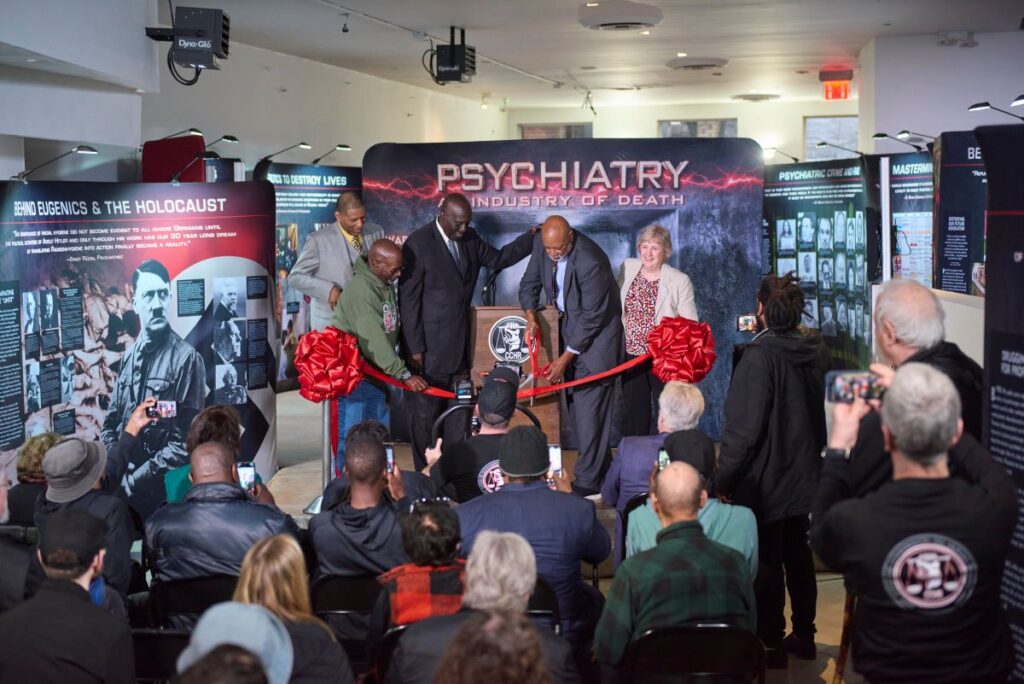Notable New York City activists speak at opening of Citizens Commission on Human Rights’ exhibit exposing sordid history of harmful psychiatric practices still in use today. The exhibit runs at Union Square in New York City through May 9.
Citizens Commission on Human Rights (CCHR), an international mental health industry watchdog, held the Grand Opening of its traveling exhibit, entitled “Psychiatry: An Industry of Death.” The exhibit brings to light the history to the present day of the harm and human rights abuses of coercive psychiatric practices, including nonconsensual electroconvulsive therapy (ECT). Forced mental health practices violate international human rights standards but are still endorsed in the U.S. by the American Psychiatric Association (APA). CCHR advocates for state and federal laws eliminating coercive practices and banning ECT.

The event’s keynote speaker, CCHR International spokesperson and founder of the CCHR Task Force Against Racism and Modern-Day Eugenics, Rev. Fred Shaw, spoke about the damage people can experience from psychiatric drugs and ECT and stressed the importance of patients getting the risks fully disclosed to them.
“A trap wouldn’t be a trap if you could see it coming,” he said. “This exhibit brings the truth about psychiatric drugs and electroshock.”
Marion “Tiny” Frampton, a former gang member in The Black Spades (TBS) and now Harlem community activist and founder of TBS New Directions, a youth mentoring program offering alternatives to youth gang involvement, spoke passionately about the damage he has witnessed from psychiatric drugs and ECT.
“I’m a former gang member in the ‘70s,” he said. “Most of my comrades were placed in mental institutions and were given all kinds of drugs and were even given shock therapy (ECT). For years I watched a lot of my comrades leave prison and be forced to take these medications.”
“Most of my comrades who are alive today are still on medication [and] are homeless,” he continued. “The medication has been in their system so long, they can’t get off it.”
Former Harlem Globetrotter and now international goodwill ambassador Bobby “Zorro” Hunter saw firsthand the adverse effects of psychiatric drugs on teens when he taught at a high school for pregnant girls. He talked about the need to give kids the help they really need instead of drugging them.
“Saving kids is so important because some day those kids will lead us,” he said.
His sentiment was echoed by Maliki Stone, a detective for 22 years with the New York Police Department and now a human rights advocate, who expressed concern that kids should not be harmed by the mental health treatment they receive.
The damage from coerced mental health treatment was the incentive for the 2023 call from the World Health Organization (WHO) and the Office of the United Nations High Commissioner for Human Rights (OHCHR) for an end to all forced mental health treatment, saying that nonconsensual practices, “violate the right to be protected from torture or cruel, inhumane and degrading treatment.” Coercive practices include involuntary institutionalization, forced drugging, the use of restraints and seclusion, and nonconsensual electroshock.
Facts presented in the CCHR exhibit reveal the staggering number of children prescribed psychiatric drugs, psychiatry’s sordid history of brain-damaging psychosurgery and electroshock, and the prime role of psychiatrists in instigating and perpetuating the systemic racism still ingrained in psychiatric practices in today’s mental health system.
The exhibit is open through May 9 from 11:00 a.m. to 9:00 p.m. at 37 Union Square in New York City.
